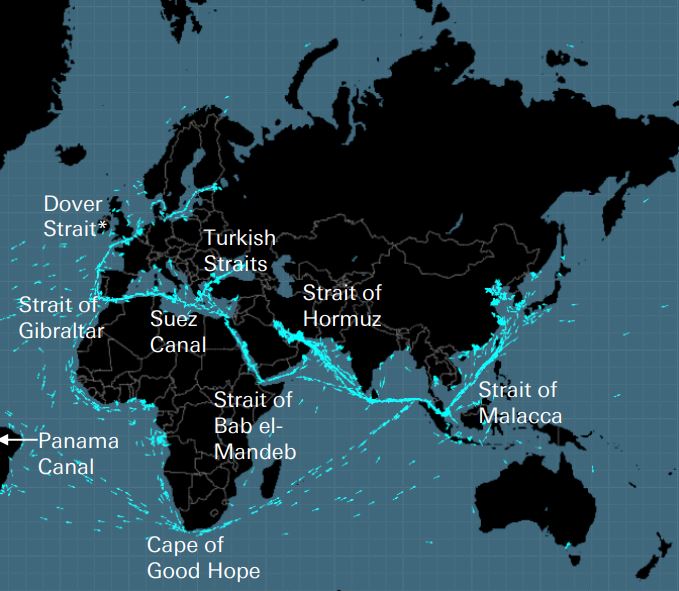
Kablar, rörledningar, vägar, sjösund, flygrutter och satelliter bildar det bräckliga nätverk som den globala ekonomin bygger på. Dessa är osynliga nätverk av enorm betydelse för den globala leveranskedjan och det moderna livet, som dock bara kommer ihåg när ett krig som det i Ukraina eller Israel hotar en av dessa strategiska punkter. Deutsche Banks studie belyser de fem svaga länkarna i den globala ekonomin. Det vill säga de infrastrukturer som inte kan ersättas av något alternativ och därför kan blockera den globala leveranskedjan.
Det finns några sårbarheter i den globala ekonomin som är mer eller mindre kända för alla, som Taiwans halvledarfabriker, globala finanscentra och 0.5% av tunnelbanestationer i London och Paris som kan blockera det halva nätet.
Men det finns också de osynliga men mycket viktiga nätverken, vilket framgick av skadorna på en undervattensgasledning och telekommunikationskabel mellan Finland och Estland den 10 oktober, som påminner om sabotaget av Nord Stream-ledningen för ett år sedan. 2010 "jordade" utbrottet av en vulkan på Island en sekund av Europas flygtrafik under 8 dagar, konstaterar Deutsche Bank.
Både Ukraina och Israel ligger nära så viktiga punkter för den globala ekonomin.
– Datakablar: Upp till 99% av världens digitala kommunikationer samt 10 biljoner finansiella transaktioner. dollar, passera genom fiberoptiska kablar placerade på havsbotten. Det finns cirka 550 aktiva och planerade kablar som spänner över 1,4 miljoner kilometer. Många är knappt tjockare än en vattenkanna, förklarar Deutsche Bank. Dessa kablar är känsliga för spionage och sabotage och för oavsiktlig skada.
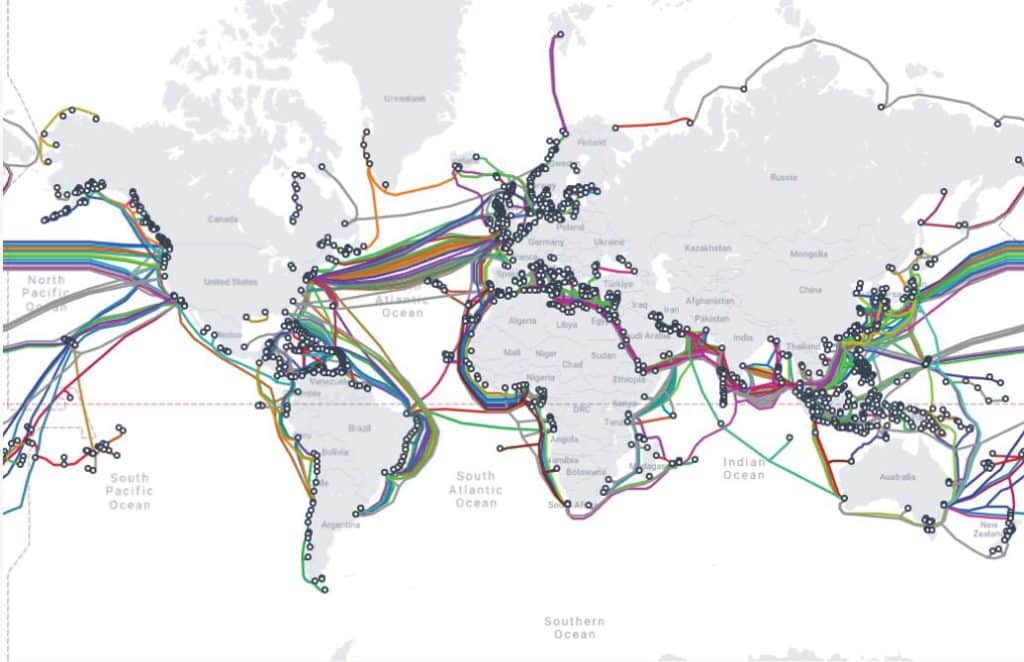
– Undervattenskablar: Kraftsammankopplingar gör det möjligt för länder att köpa billigare vind- eller solkraft från sina grannar med gynnsammare väder, vilket ökar försörjningstryggheten och bättre hanterar efterfrågan. Men de kan förstöras genom sabotage eller olycka.
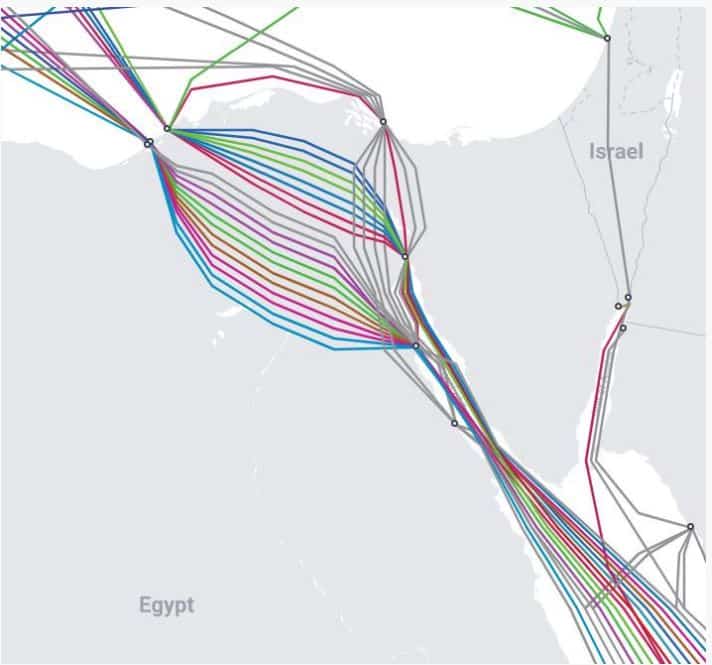
– Naturgasledningar: Europa är beroende av rörledningar för de flesta av sina naturgasleveranser. År 2020 importerade den nästan 40% av sin naturgas från Ryssland, och sedan dess har den varit tvungen att förlita sig på rörledningar från Norge och importerad LNG. Som Nord Stream-explosionerna visade är dessa rörledningar sårbara för sabotage.
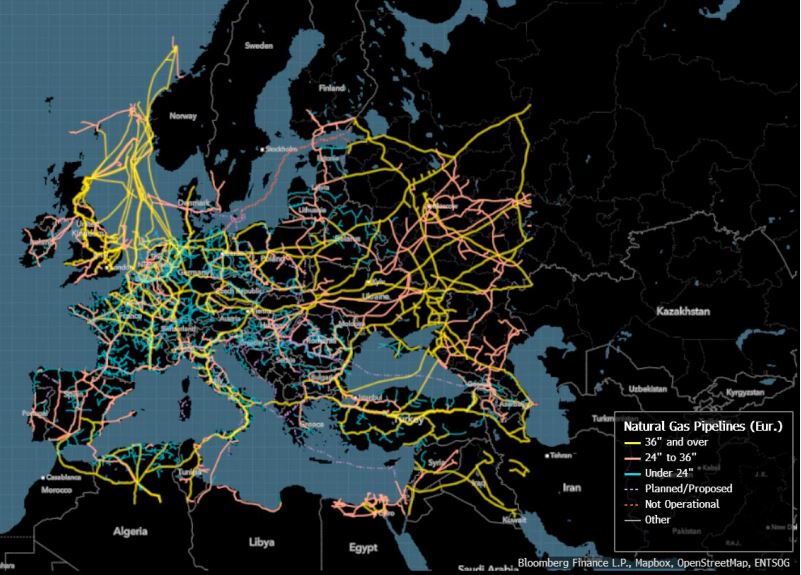
– Oljeledningar: De flesta av världens oljeledningar finns i Europa och Asien och utgår från Ryssland. En typisk oljeledning är cirka 50 centimeter i diameter och kan bära över 1 miljon liter (eller 6 300 fat per timme). Som jämförelse kan en tunna bära mindre än 200 tunnor åt gången. Rörledningar är gjorda av stål och är om möjligt nedgrävda i marken. Liksom naturgasledningar är de sårbara för skador, jordbävningar och sabotage.
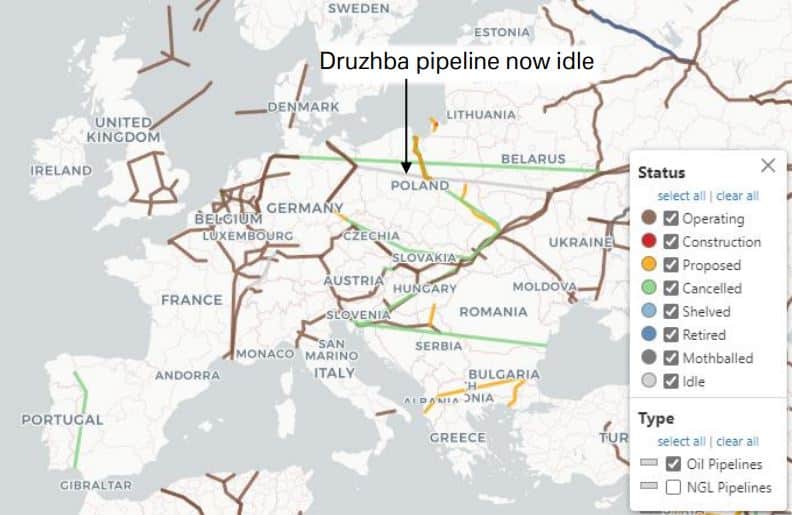
Vissa järnvägar och vägar på avlägsna platser bär en oproportionerligt stor del av leveranser som är avgörande för den globala ekonomin, utan alternativ. Ett stort område i Kongo och Zambia är till exempel Afrikas största producent av koppar och står för två tredjedelar av världens koboltproduktion. Men det finns bara fyra vägar, alla dåliga och överbelastade, för att transportera dessa råvaror från gruvorna till hamnar i Namibia, Sydafrika, Moçambique och Tanzania. Något liknande händer med Brasiliens soja, som är världens främsta exportör. Under de senaste två åren har torkan drabbat floder som är viktiga vattendrag, vilket visar hur sårbara dessa transporter är.
Tillsammans med Godahoppsudden finns det 8 viktiga "sund" för sjötransporter. Som Deutsche Bank förklarar är det här de fem "nycklarna som låste upp världen" för det brittiska imperiet, om Doversundet tas bort och Panamakanalen, Turkiska sundet, Bab el Madeb sund och Hormuzsundet läggs till . Inom olja, till exempel, transporteras mer än 60% av leveranser sjövägen, med Hormuzsundet som den viktigaste punkten för marknaden, eftersom en femtedel av världens förbrukning (och en tredjedel av LNG) passerar genom den. På sin smalaste punkt är Hormuzsundet bara 33 kilometer brett.

Dessa sund är sårbara för blockader, fartygskollisioner eller grundstötningar, pirater, terroristattacker, krig och olyckor som oljeutsläpp.
Flygtransporter är beroende av ett osynligt nätverk av korridorer som kan störas av väder, krig eller ovanliga händelser, som när Spaniens luftrum stängdes i november förra året för att tillåta en kinesisk missil att komma in i jordens atmosfär. Strejker från flygledare har orsakat stora transportproblem i Europa i år, medan den största flygtrafikblockaden efter kriget inträffade 2010, då vulkanen på Island bröt ut.
Världen är mycket beroende av USA:s Global Positioning System (GPS). Detta använder cirka 30 satelliter för positionering, navigering och timing (PNT), som sänder signaler till över 4 miljarder användare över hela världen. Men dessa signaler är svaga och utsatta för störningar, och det har uppskattats att om GPS "klipps" kommer kostnaden att överstiga $1 miljarder per dag, bara för USA.
(KÄLLA: https://www.moneyreview.gr/business-and-finance/125480/deutsche-bank-ta-aorata-diktya-poy-kinoyn-tin-pagkosmia-oikonomia-oi-5-adynamoi-krikoi/)




Hitta alla toppleverantörer av produkter och tjänster för sjönavigering för säker sjöresasplanering